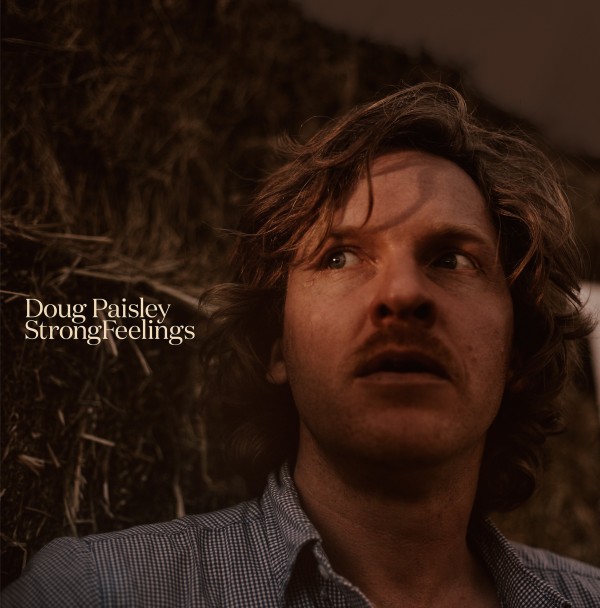
Doug Paisley
Strong Feelings
(No Quarter)
4 out of 5 stars
Videos by American Songwriter
“Alt-county” has always been something of a misnomer. Ever since Uncle Tupelo came stomping through the gates with a doublewide full of overdrive and twang, it’s always been more about “alt” than “country.” Listen to an Old 97s or Whiskeytown album, and you’ll hear the influence of Johnny Cash or Merle Haggard, but you’re just as likely to hear that of The Replacements, or alt-country’s most direct ancestor, Neil Young. A band like Wilco may very well have performed at the Grand Ole Opry – and Neko Case may have been banned from there for life, or so the story goes – but even when rubbing elbows with major Nashville players, it’s still rock music that’s coming out of their speakers.
Toronto singer-songwriter Doug Paisley is ostensibly an alt-country artist. He’s toured with Bonnie ‘Prince’ Billy, combined live music with performance art, and isn’t shy about plugging in a distortion pedal or an analog synthesizer. But calling him an alt-country artist also oversimplifies things a bit. His music has a rich, organic sound, beaming with warmth and mellifluous arrangements – at times taking on more of a chamber-pop sound than country, or even rock. But his voice – an earnest, soulful baritone – is most certainly a country voice, which conveys the sadness and beauty of his songs better than lap steel or honky-tonk piano ever could.
On Paisley’s third full-length album, Strong Feelings – the latest release in a long line of EP’s and related projects – Paisley looks to neither ’90s-era No Depression alt-country nor classic country as inspiration so much as he does the ’70s folk-rock sounds of Gram Parsons, Neil Young and The Band, whose Garth Hudson provides some gorgeous, hearty piano textures throughout the album. Its sound is breezy and sumptuous, stylistically attractive but overflowing with honest feelings. On paper that seems to look a lot like the M.O. of a C&W artist, but even at his most earnest or folksy, Paisley never gets too comfortable staying in one place, musically speaking.
Strong Feelings opens with some brief piano licks from Hudson before kick-starting the beautifully scruffy opening song, “Radio Girl.” It has an easy-going, lived-in feel – it’s downright comforting. But at the heart of it is the kind of loneliness that has made hard-luck poets pick up a guitar and start strumming for the past century. “When the radio wave has all drowned out and you’re drifting too far from the shore,” Paisley sings, “When there’s nobody else to cling to anymore/ I turn the radio on.”
For the first half of the record, Paisley keeps up a steady pace of gritty albeit gently strummed, whiskey-chased heartbreakers, from Hammond-heavy toe-tapper “Song My Love Can Sing” to the stripped-down “What’s Up Is Down,” which kicks off with an opening riff that sounds a lot like that of The Beatles’ “In My Life.” And during this progression of songs, Paisley comes across like Ryan Adams circa Heartbreaker, if he were merely melancholy rather than depressed, and with fewer Morrissey references. But in its second half, the tone of Strong Feelings becomes more playful, if not necessarily upbeat. The sprightly rhythms, and mixture of organ and mellotron on “Growing Souls” is more Jon Brion than John Prine. Yet for a song that carries such a whimsical arrangement, it opens with a grisly scene of a boxer hitting the mat: “It was a fatal blow/ Just ahead of the bell …” Similarly, there’s a gentle, smoky jazz influence that colors the beginning of “Where the Light Takes You,” which builds up magnificently into an anthemic, harder rocking chorus.
The moments in which Paisley lets loose and turns up the volume are sparse, but when they arrive, they can be some of the most rewarding on the album. “To And Fro,” in particular, stands out for its ragged, Crazy Horse-style riffs and heavy plod. For four minutes, Paisley shakes off the amiable cool of much of the record and opts for a darker, sharpened sound that hits hard and leaves a mark. “It’s Not Too Late (To Say Goodbye)” finds the singer-songwriter taking on a similar approach, but without kicking up quite as much dust – just shedding a few more tears.
Closing track “Because I Love You” finds Paisley engaged in a sparse, bittersweet duet with Americana vet Mary Margaret O’Hara. And though it, too, carries a bit of the sadness that permeates Strong Feelings, there’s something rich and nourishing about it. And that’s true of all of Doug Paisley’s music, which is strong on melody and comes from a place of genuine emotion. Whatever you choose to call it, music like this is universal.













Leave a Reply
Only members can comment. Become a member. Already a member? Log in.